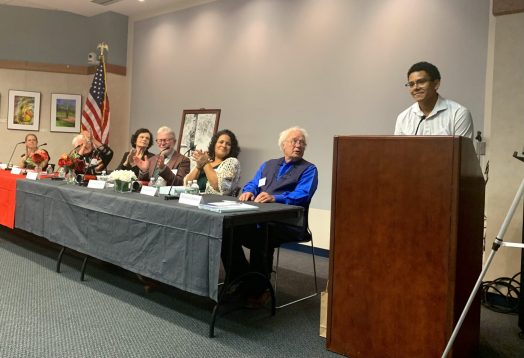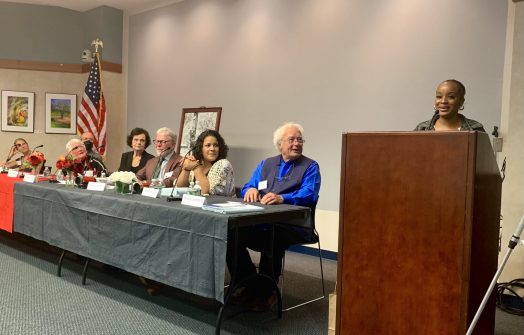It’s been said that “there are only two lasting bequests we can hope to give our children. One of these is roots, the other, wings.” A prominent newspaper editor in the 1950s referred to the source of the adage as “a wise woman,” and over the years various speakers have claimed credit for the words. The historical record of the speaker may be muddy, but the metaphor remains clear—the idea behind roots and wings is that if a family and community are doing it right, the kids in their care come away with a strong sense of where they came from (the roots) and the power and confidence to live their dreams (the wings).
Staying grounded, taking flight
The Roots and Wings: Wellesley High’s Legacy of Nurturing Creativity program at the Wellesley Free Library last week celebrated Wellesley High School’s long history of graduates who are writers, and the teachers who inspired them. During a panel discussion moderated by Beth Hinchliffe, herself a former presidential speechwriter and the town historian, WHS graduates who are writers spoke about their formative years in Wellesley and how their teachers set them on their path.
The Roots and Wings project as explained by Hinchcliffe is the opportunity to come together as a community, celebrate Wellesley’s legacy of nurturing academic excellence and creativity, and “ensure that we and our schools will continue to value this rare tradition and to urgently commit to keeping it a priority in our future.”
Hinchcliffe is proudly keeping score—she and the Roots and Wings team have assembled a work-in-progress list of over 125 WHS graduates who are writers. The project celebrates writers who are wordsmiths in all genres including fiction, nonfiction, scriptwriting, journalism, and poetry.
The event and project are in honor of Katharine Lee Bates (WHS class of 1874, and namesake of Bates Elementary School), Sylvia Plath (class of 1950), Wilbury Crockett (WHS English teacher 1944-1980, chair for 30 years), and all WHS writers and teachers past, present, and future.
Richard Preston, from reluctant reader to prolific author
Richard Preston, author of the New York Times #1 bestseller The Hot Zone, a true account of the study of Marburg and Ebola viruses in the years preceding the full-blown epidemic (among many other bestsellers), knows how to speak up now, but as a small, shy Hunnewell student, he had difficulty learning how to read. “I was behind much of the class. but the teacher spoke to my mother and said ‘I think you should try him on comic books.'”

Exposure to plenty of Superman and Casper the Friendly Ghost led to his realization that there was not only something to this reading thing, but there was a whole Wellesley Free Library of books in walking distance from Hunnewell. Preston had found his new happy place. At WHS, Preston said teachers Jeanie Goddard, Jerry Murphy (deceased, 2019), and Wilbury Crockett (deceased, 1994) were instrumental in his early development as a writer, preparing him for Pomona College, where he majored in English, and graduated summa cum laude, followed by graduate school at Princeton University, where he got his Ph.D. in English.
Adam Haslett, no stranger to Wellesley
Adam Haslett, two-time finalist for both the Pulitzer Prize and National Book Award for You Are Not a Stranger Here and his most recent novel, Imagine Me Gone, has also received Guggenheim and Rockefeller Foundation Fellowships. He spoke about how teachers encouraged freedom of thought.

“One of the things Jeanie did in her class was show us a documentary called Webster Grows” about a 1960s St. Louis suburb where white suburban families embraced conformity rather than truly live their purported liberal ideals. Of the WHS English department faculty he said, “These teachers took teenagers’ minds seriously, which seems like a challenge.”
At Swarthmore College, Haslett’s writing ability continued to be nurtured, most notably by faculty member (and internationally acclaimed author of five novels, including The Corrections), Jonathan Franzen.
They always knew Nina Shope was going places
Nina Shope, the author of Hangings: Three Novellas, was the kind of student who in high school analyzed dream symbolism in the works of Dostoevsky, submitted an early novel-in-progress to her English teacher, Mrs. McCoy, and turned in a 42-page end-of-year paper at the age of 15. Here’s the kicker—to the delight of the audience, Shope brought that 42-page paper with her all the way from her home in Colorado and read from it. This is an author who was among her people and knew how to work her crowd.

She cited the high point of her high school career as winning the Sylvia Plath Creative Writing Award her senior year. “I was in awe of the fact that Plath lived in my town. Reading her poetry really reaffirmed my desire to write fiction that used the same radical condensation, symbols, and compression” techniques of the Pulitzer Prize-winning poet. “My teachers Mrs. Fralick, Mrs. Goddard, Mrs. Frick, and Mrs. McCoy helped me learn to trust my voice and also to love literary analysis and difficult writers.”
From WHS, Shope earned her B.A. from Brown University and am MFA from Syracuse University. Shope is also a textiles artist.
Wellesley will always claim Vanessa Mártir
She may not have been raised in Wellesley, but the town will always claim A Better Chance program alumna Vanessa Mártir as one of its own. Her stirring essays have appeared in publications including The New York Times, The Washington Post, The Guardian, Poets & Writers, and numerous anthologies. Moderator Hinchcliffe called Mártir, “a novelist, poet, and playwright, as well as our social conscious, and the voice that calls out to our better selves.”

In order for the audience to understand her experience, Mártir told the story of where she came from. “I am from Bushwick, Brooklyn. Not the Bushwick, Brooklyn of today that everyone wants to live in. I am from Bushwick when it was a pile of rubble,” as a result of the blackout of 1977 and its resulting riots, as well as the crack epidemic of the 1980s. “We lived among that, and also these burnt out buildings that they just left there because no one cared enough about us to do anything about it, for years,” she said.
While she was very smart, Mártir’s behavioral issues at her New York City middle school got her into trouble. “I got into a fight with a girl, and I knocked down two of my teachers trying to get to that girl,” she related. During an intervention of sorts, a guidance counselor recommended that Mártir apply to the Wellesley ABC program. Once at WHS, micro-aggressions abounded in the hallways. “Let me hear you tawk, Rosie,” demanded students who didn’t know what to make of this brash, confident girl in their midst. Everything they knew about Mártir’s accent they’d learned from actress Rosie Perez in the movie White Men Can’t Jump.
The anger that catapulted her over two teachers back in Brooklyn still simmered. Until her English teacher, Brooks Goddard, gave her a copy of The House on Mango Street by Sandra Cisneros. Until that novel, Mártir had never read anything that even came close to resembling her life experiences. It was life changing. While in college at Columbia University, Mártir took every Latino literature and culture class she could.
Although Mártir will always be a fighter, of that girl from long ago she says, “I am no longer that angry, I now have words. Now these fists have a pen.”
Brooks Goddard, ever the gentleman
The clock was ticking, and WHS retired WHS English department head Brooks Goddard (and co-legend along with his wife, Jeanie) was scheduled to say a few words. But he demurred, giving up his speaking time so that others might have their moment in the spotlight, unhurried, before the library closed. Suggesting everything of import had already been covered by others that evening, Brooks choked up as he said, “I followed the legend [referring to Crockett], and I married a saint.”
The bright future of Wellesley High writing
The evening closed with a special treat, a reading of original poetic works by Derek Jiminez and Maya McNeill, both WHS class of 2023. “Our two young Wellesley High poets promise a noble continuation of writing glories,” Jeanie Goddard said in her introduction of Jiminez and McNeill. “How lucky, lucky, lucky, we all are to have them.”


At Swellesley, we write a little every now and then. Don’t miss a word. Subscribe to our daily email




To quote you, Deborah Brown:
“At Swellesley, we write a little every now and then. Don’t miss a word. Subscribe to our daily email”.
(Pls subscribe if not already a subscriber!)
You and your husband, Bob, do an incredible job of keeping us informed about anything and everything Wellesley!
I’m sorry I couldn’t be there but you and Beth Hinchliffe, as moderator, did a wonderful job of recapturing the event and I’m glad I mentioned it to you since we had previously discussed Sylvia Plath and Wellesley High School was and always will be mine, too!